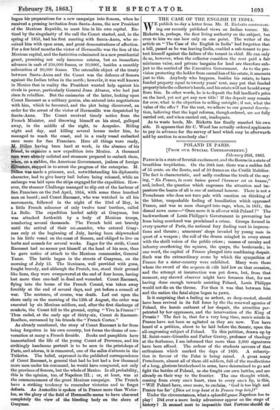THE CASE OF THE ENGLISH IN INDIA.
WE publish to-day a letter from Mr. H. Ricketts controvert- ing our recently published views on Indian tenure. Mr. Ricketts is, perhaps, the first living authority on the subject, but even to him we can bow only on one .point. The writer of the article on " The Case of the English in India" had forgotten that a bill, passed as be was leaving India, enabled a sub-tenant to pro- tect himself against the failure of the tenant in chief. He can only do so, however, when the collector considers the rent paid a fair minimum value, and private bargains for land are therefore sub- ject to the control of the Executive Government. As to the pro- vision protecting the holder from casual loss of his estate, it amounts just to this. Anybody who happens, besides his estate, to have funded property equal to twenty years' rent, may put that funded property intothe collector's hands, and his estate w ill not besold away from him. In other words, he is to deposit the full landlord's price on the land, yet not get any new title ! If the deposit may remain for ever, what is the objection to selling outright ; if not, what the value of the offer ? For the rest, we adhere to our general descrip- tion, believing that the legal reforms, though ordered, are not fully carried out, and when carried out, inadequate.
As to waste lands, Mr. Ricketts has finally smashed his own side. It appears that Sir C. Wood has actually ordered applicants to pay in advance for the survey of land which may be afterwards sold by auction to scmebody else 1






























 Previous page
Previous page